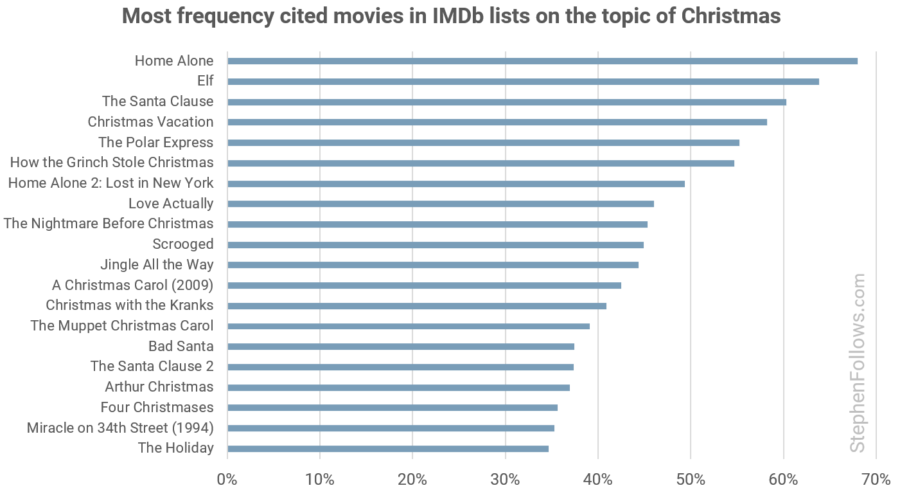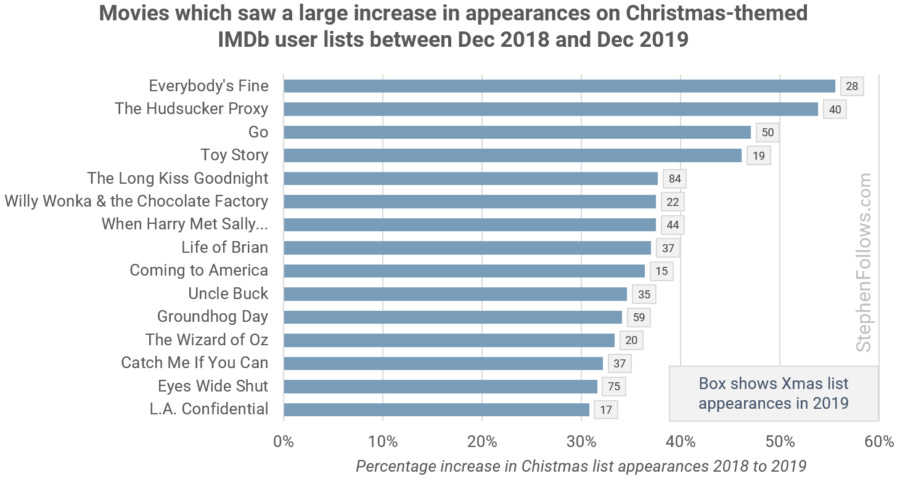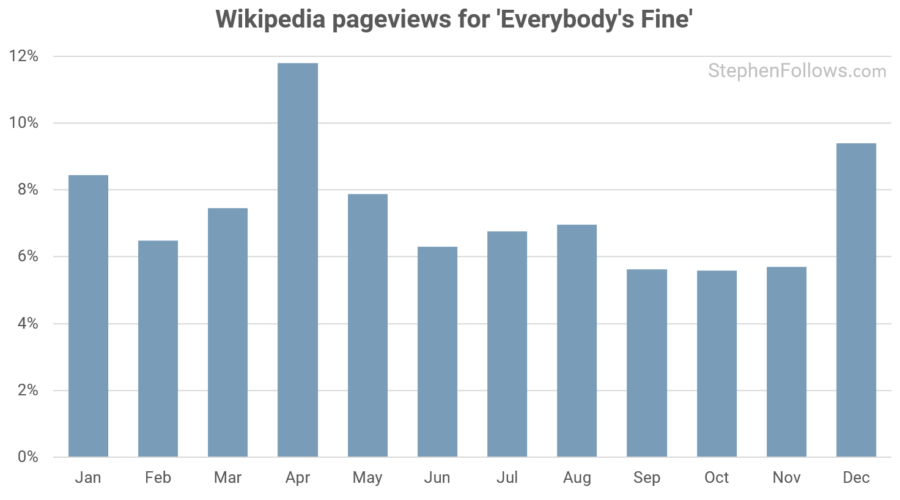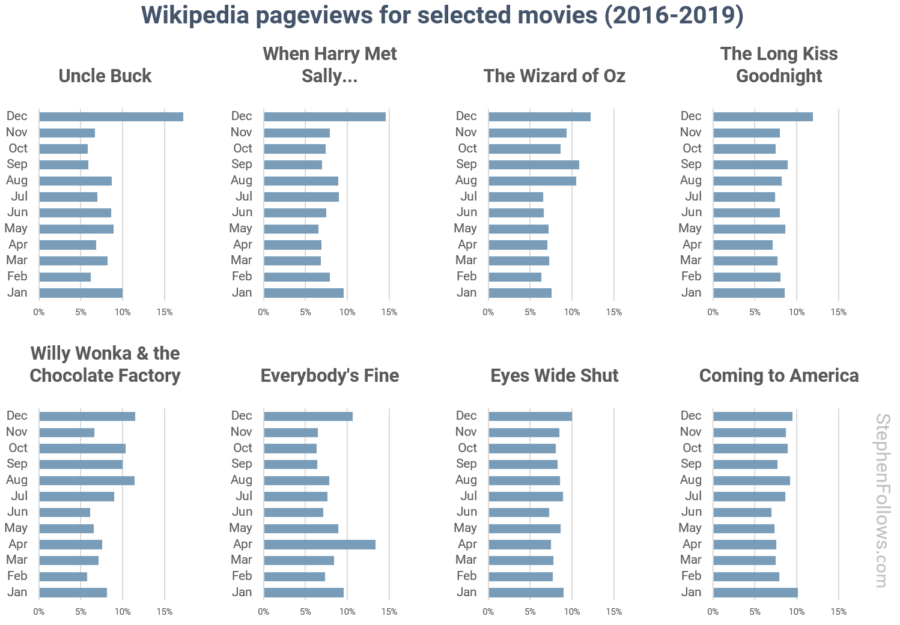After Die Hard, what's the next most contentious "Christmas" movie?

Last year, I used a variety of data-led indicators to assess the claim that Die Hard is a Christmas movie.
If you don't want any spoilers as to the result, stop reading this now and head on over to that article.
I used three categories of indicators through which a movie's "Christmasness" could be judged - artistic, commercial and cultural. The first considers what's in the movie, the second how it's sold and the third how it's perceived.
As time moves on, it's the final of those three which becomes most crucial. The artistic nature of the film remains static (well, unless George Lucas gets to it) and the commercial lens is not very reliable, given movie marketers' penchant for pushing literally anything which sells (Note the 'Ho Ho Hodor' Game of Thrones merch).
So it's our changing perception of movies which is the best marker of a movie's Christmasness (and indeed its Christmaslessness). As Die Hard is increasingly being associated with the Christmas period, it is becoming a Christmas movie, even if it wasn't ten years ago.
This got me thinking - what other movies are on their way to belated beatification into the Christmas canon?
The rules of this search

To state the terms plainly, I am searching for the movie which is most likely to cause arguments in the coming years as to its Christmas status, and then a few years later be accepted by all as required Christmas viewing.
I have drawn up a festive criteria to help narrow down our search, which I am calling "The Ten Data-Points of Christmas Movies" (and can be set to the tune of "The 12 Days of Christmas", should one desire):
Ten years or older - Part of the fervour with which people argue over Die Hard is that we each thought that the perception of the movie has long ago been litigated. So when someone suggests a new interpretation, it can come across as jarring. Therefore, we are looking for a non-recent movie which is becoming a Christmas movie. I've selected movies released before 2010 (with the added bonus of these dates being that I don't have to adjudicate Disney's recent claim that Iron Man 3 is Christmas movie).
Designed not for Christmas - The film should not have been intended to be a Christmas movie at the time of release. To measure this, I'm using the month it was first in US cinemas, and excluding any films released in November and December.
Ratings really matter - I am excluding films rated at 18 in the UK as a movie that extreme is unlikely to catch on as a Christmas classic.
Setting scene salience - If the film takes place at Christmas (in a way which is integral to the plot) or is about the topic of Christmas itself then it can't be included. We're looking for the unlikely choice.
Six stars are needed - Audiences need to love the movie so it should get at least six out of ten on IMDb.
Fifty-thousand votes - To ensure it's a movie many people have heard of, I'm going to require a minimum of 50,000 user votes on IMDb.
For families - It needs to feel at least mildly family-friendly. Although Die Hard has swearing and violence, it doesn't have sex, nudity, doesn't encourage drug-taking or contain other undesirable elements for the Christmas period.
Theme matches trends - It should be thematically connected to the holidays. Movies people like to watch over Christmas tend to relate to relationships and/or families.
Two worthwhile sides - The movie needs to be debatable, not a slam dunk in either direction.
And an arguably fair fight - At its core, this "Is [x] a Christmas movie?" debate only works when it's fun and everyone feels empowered to pick a side. Therefore, the final movie should be well-known and enjoyable to rewatch.
Already-christened Christmas movies
We'll start our journey looking at the movies already commonly associated with Christmas, using public lists created by IMDb users. I found 2,035 lists which directly purported to contain Christmas movies, such as The Top 100 Christmas movies of all-time, Christmas Movies and 100 Movies set in winter time: Christmas time.
The movie which is most frequently cited in Christmas lists is Home Alone. The 1990 classic covers all the bases - it's about Christmas, set at Christmas time, can be enjoyed by all and speaks to the themes of the holiday (i.e. family, loneliness and defending your home from an onslaught of unwanted visitors).

Changes in Christmas confidence
Not only can these lists tell us which movies are regarded as Christmassy, but they can also help us track cultural shifts. I narrowed in on the changes made to Christmas-themed lists over the past twelve months in order to see which movies are becoming more prevalent.
For example, in December 2018, Home Alone appeared on 1,207 Christmas-themed lists. Twelve months later and that has grown to 1,333 - a 10.4% increase. Die Hard has grown by 15.7%, meaning that if the current trend continues, Die Hard will overtake Home Alone in December 2036 - just in time for the film's 50th anniversary.
The film (from my specific criteria) which is undergoing the fastest Christmasification is 2009's Everybody's' Fine, starring Robert De Niro, Kate Beckinsale and Sam Rockwell. IMDb sums up the plot as "A widower who realized his only connection to his family was through his wife sets off on an impromptu road trip to reunite with each of his grown children".

IMDb lists are good for tracking the changing views of cinephiles but in order to identify the perfect Christmas controversy, we need to ensure that enough people in the wider culture also think of it as a holiday classic.
Festival timings
Data on Wikipedia pageviews is a rough proxy for levels of wider interest. If a growing number of people regard a film as a Chrismas classic then we would expect to see increased interest at, well, Christmas time.
Looking at the pageviews for Everybody's Fine reveals that it's unlikely to be our final answer. The busiest month was April and overall December accounted for under 11% of the annual traffic.

I ran the same data on the other shortlisted movies the IMDb list route suggested and there seem to be two clear winners - Uncle Buck, followed closely by When Harry Met Sally.
17% of visits to the Uncle Buck Wikipedia page happen in December, and for When Harry Met Sally it's almost 15%.

Given the data above, and the fact that the rom-com genre is less family orientated, my money is on Uncle Buck.
The 1989 John Hughes classic has a lot you could want in a heavily-disputed new Christmas classic:
Nostalgic movie for many adults - Released just one year after Die Hard.
Simple concept - Bachelor and all-round slob Buck babysits his brother's rebellious teenage daughter and her cute younger brother and sister.
Christmas themes - Family (current and distant), generational clash and warmhearted approach and outcome
Well-liked by audiences - 7 out of 10 in IMDb.
Loveable cast - John Candy and Home Alone's Macaulay Culkin.
Easy to watch - A light comedy with many visual gags.
Momentum - An increasing number of people already regard it as a movie connected to Christmas time.
Acting against it are:
Moderate sexual content - No nudity but there's a scene of implied attempted non-consensual sex and another where John Candy tells a washing machine "I'm gonna put my load into you whether you want me to or not".
Swearing - A lot of quite mild swear words, including 17 shits, 4 bitches, 3 asses, 2 assholes and 1 piss-ant, bastard and dildo.
It's no Die Hard - Critics weren't a big fan of the movie.
LA Times - "Uncle Buck has a medium-level Hughes script, only about half as good as "Planes, Trains and Automobiles"
Roger Ebert - "Uncle Buck attempts to tell a heart-warming story through a series of uncomfortable and unpleasant scenes; it's a tug-of-war between its ambitions and its methods".
New York Times - "Sometimes funny and, in the way of small-screen entertainment, so perfectly predictable that one could mail in the laughs".
Decide for yourself...
https://www.youtube.com/watch?v=JQaeUz7K83w
Notes
Wikipedia data runs from 1st December 2015 to 30th November 2019. For readability's sake, I've labelled this as 2016-19.
Epilogue
The release date is a broadly useful measure of intended Christmasness, but not perfect. The Long Kiss Goodnight managed to slip onto the 'increasingly cited' list as it came out in the US in October. That said, its overt Christmas content would have prevented it from winning the title anyhow.
Oh, and Die Hard came out in July and that's definitely a Christmas movie. Wanna check my maths...?


